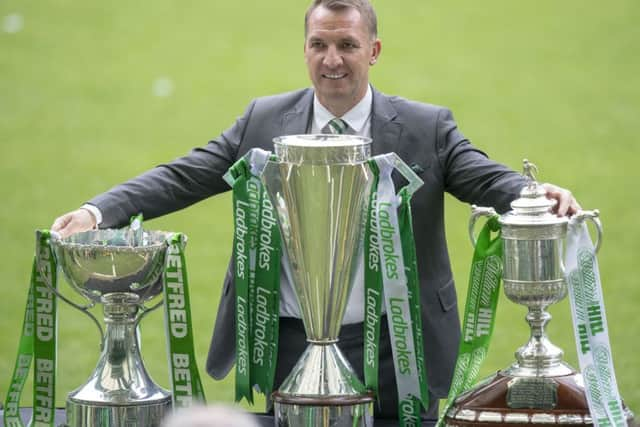Andrew Smith: How will Brendan Rodgers be regarded in the pantheon of Celtic managers?
In reverse order, the Irishman is the first in the club’s 130-year history to be enticed away for what he considers a better offer during a campaign.
His haste at ending the affair with a club he would profess his love for so gushingly comes at the first fluttering of eyelashes towards him from a middle-ranking English Premier League club.
Advertisement
Hide AdAdvertisement
Hide AdIn some supporters’ eyes this will undoubtedly dull the sheen with which his stewardship has glinted.


For Rodgers’ time at Celtic has been framed by silver and gold in utterly astonishing fashion: every single one of the seven pieces of domestic silverware he contested in Scotland were won because he achieved gold standards.
He simply rewrote both the record books of the club and Scottish football. His first season, when he was the inspirational figure for a treble that in unprecedented fashion was delivered without the single loss of a domestic game, will stand apart from every other term in the post-war period - which brought the introduction of a third trophy - for time immemorial. It is fanciful to see it ever being replicated.
To then follow that with a second straight treble was just as astonishing. He also recently became the first manager to win 24 domestic cup ties on the spin.
Ultimately, though, in spending only two full seasons at the club, Rodgers’ tenure is one of the briefest among the 19 men to have held the Celtic post permanently. That may be factored into how he is recalled.
Yet there is a powerful argument for stating that his coaching prowess places him in the very upper echelons of the club’s managerial pantheon, alongside even Jock Stein.
His transformative powers in how he developed the players under him, at times, were bordering on the miraculous. His methods made for an attacking footballing style that placed him firmly at one with historical demand placed on Celtic teams to embrace entertainment and enterprise as their raison d’etre.
Equally, any assessment of Rodgers must not overlook his immaculate decorum on and off the pitch. He was a figurehead who presented the very best image of himself and Celtic.
Advertisement
Hide AdAdvertisement
Hide AdThat spoke to his obsession with presentation, with controlling the message. Indeed, so measured was he in his manner and news management, he took this to an almost frightening - and, at times, unconsciously funny - levels.
Rodgers, for all that he has left Celtic with the platform to clinch a third treble, probably won’t be recalled with quite the same affection as Stein, Martin O’Neill and possibly even his temporary replacement, Neil Lennon.
Each of those three picked up a failing Celtic and turned the tables to eclipse then dominant Rangers sides. When it boils down to it, Rodgers has taken Celtic from five-in-a-row in their quest for the unprecedented ten straight league titles, to the verge of eight. In time, that will be infused into his legacy.
Moreover, he did not enjoy the same wondrous European nights, especially at Celtic Park, that Stein, O’Neill, Gordon Strachan and Lennon all conjured up to varying extents.
In no small part, that is related to it becoming hugely more difficult owing to the financial differentials that have grown exponentially in recent times.
Even as Celtic’s board sanctioned Rodgers doubling the club’s wage bill to a highest-ever figure of £60 million - something that shouldn’t be forgotten as inevitable claims that he was not given enough financial backing are aired - the Scottish champions were rendered relatively small fry in continental waters.
Only in missing out on the Champions League group stages for the first time last summer, following two successful qualifying campaigns, did he fall short of what can rightly be expected of Celtic in the current era.
Yet, his difficulties, nay unwillingness, to adapt his free-flowing philosophy to contrasting European demands certainly underpinned his suffering as many as seven home defeats in continental competition.
Advertisement
Hide AdAdvertisement
Hide AdIt is another way in which he can be separated from any other Celtic manager, albeit an unwanted one. Yet it makes Rodgers no less a remarkable, and remarkably successful, figure in Scottish football.
Our game was fortunate to have the presence of such a top operator, and enriched by it.
Ultimately, having never entirely disabused anyone of the impression he was somehow lowering himself to work within the modest confines of the Scottish game, the Northern Irishman thought so too.